| Listing 1 - 10 of 34 | << page >> |
Sort by
|
Book
ISBN: 888587665X Year: 2002 Publisher: Roma : Herder,
Abstract | Keywords | Export | Availability | Bookmark
 Loading...
Loading...Choose an application
- Reference Manager
- EndNote
- RefWorks (Direct export to RefWorks)
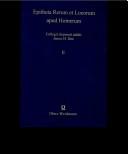
ISBN: 3487117657 3487117665 9783487117669 9783487117652 Year: 2002 Volume: 230 Publisher: Hildesheim: Zürich: New York: Olms-Weidmann,
Abstract | Keywords | Export | Availability | Bookmark
 Loading...
Loading...Choose an application
- Reference Manager
- EndNote
- RefWorks (Direct export to RefWorks)
Greek language --- Description (Rhetoric) --- Rhetoric, Ancient --- Epithets --- Homer --- Homer. --- Language
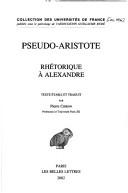
ISBN: 225100498X 9782251004983 Year: 2002 Volume: 416 Publisher: Paris : Belles Lettres,
Abstract | Keywords | Export | Availability | Bookmark
 Loading...
Loading...Choose an application
- Reference Manager
- EndNote
- RefWorks (Direct export to RefWorks)
L'ouvrage que la tradition médiévale attribuait à Aristote et qui nous a été transmis sous le nom de Rhétorique à Alexandre constitue un précieux témoignage sur la plus ancienne tradition oratoire grecque. L'étude du texte permet d'y déceler l'influence de la sophistique, perceptible dans l'amoralisme d'une pratique rhétorique visant à persuader à tout prix. Le traité laisse aussi transparaître la pensée d'Isocrate. Cet aspect a permis aux spécialistes de le situer avant la Rhétorique d'Aristote, vers la fin de la production des orateurs attiques. Par comparaison, la Rhétorique à Alexandre permet de mieux comprendre l'apport d'Aristote à la théorisation de l'éloquence. Là où Aristote décrit une rhétorique idéale fondée sur la rationalisation de la persuasion, la Rhétorique à Alexandre ne comporte pas de considérations théoriques générales. Ce dernier point laisse transparaître le pragmatisme d'un rhéteur professionnel ainsi que le relativisme sceptique des anciens sophistes. Le traité comprend trois parties : la première expose des définitions et des divisions du discours en différents genres et espèces. La seconde partie traite des moyens de persuasion. La dernière partie est quant à elle consacrée à l'organisation du discours.L'édition de la Rhétorique à Alexandre dans Collection des Universités de France comprend le texte grec établi et traduit par Pierre Chiron. Le traité est précédé d'une longue introduction dans laquelle est présenté l'ouvrage. Sont évoqués dans cette présentation les questions de la datation et de l'attribution du texte, ses relations avec l'ancienne Rhétorique et sa tradition manuscrite. L'ouvrage est enfin enrichi de notes ainsi que de deux index, l'un consacré aux personnes et l'autre aux noms.
Rhetoric, Ancient. --- Rhétorique ancienne --- Classical Greek literature --- retoriek
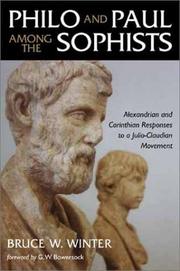
ISBN: 0802839770 9780802839770 Year: 2002 Publisher: Grand Rapids (Mich.) : Eerdmans,
Abstract | Keywords | Export | Availability | Bookmark
 Loading...
Loading...Choose an application
- Reference Manager
- EndNote
- RefWorks (Direct export to RefWorks)
Rhetoric in the Bible. --- Rhetoric, Ancient. --- Sophists (Greek philosophy). --- Sophists (Greek philosophy)
Book
Year: 2002 Publisher: Catania : CULC,
Abstract | Keywords | Export | Availability | Bookmark
 Loading...
Loading...Choose an application
- Reference Manager
- EndNote
- RefWorks (Direct export to RefWorks)
Popes --- Church history --- Rhetoric, Ancient --- Rhetoric, Medieval --- Primacy --- History --- Orthodox Eastern Church --- Catholic Church --- Relations
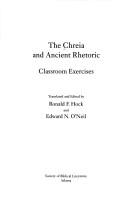
ISBN: 1589830180 Year: 2002 Volume: 2 Publisher: Atlanta : Society of Biblical Literature,
Abstract | Keywords | Export | Availability | Bookmark
 Loading...
Loading...Choose an application
- Reference Manager
- EndNote
- RefWorks (Direct export to RefWorks)
Chreiai. --- Rhetoric, Ancient --- Education, Ancient --- Chrie --- Rhétorique ancienne --- Education antique --- Education --- Rhetoric --- Rhétorique ancienne --- Rhetoric, Ancient. --- Chreiai --- Chreiai, Classical --- Chriae --- Classical chreiai --- Classical literature --- Classical wit and humor --- Literature, Medieval --- Wit and humor, Medieval
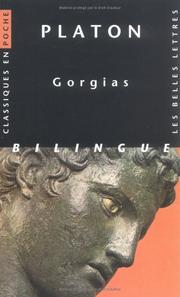
ISBN: 9782251799193 2251799192 Year: 2002 Volume: 19 Publisher: Paris: Les Belles Lettres,
Abstract | Keywords | Export | Availability | Bookmark
 Loading...
Loading...Choose an application
- Reference Manager
- EndNote
- RefWorks (Direct export to RefWorks)
Rhetoric, Ancient --- Virtue --- Ethics, Ancient --- Political science --- Happiness --- Philosophy, Ancient --- Pleasure --- Rhétorique ancienne --- Vertus --- Morale ancienne --- Science politique --- Bonheur --- Philosophie ancienne --- Plaisir --- Early works to 1800 --- Ouvrages avant 1800 --- Rhétorique ancienne --- Rhetoric, Ancient.
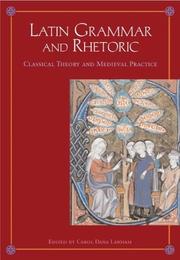
ISBN: 0826457088 9780826457080 Year: 2002 Publisher: London: Continuum,
Abstract | Keywords | Export | Availability | Bookmark
 Loading...
Loading...Choose an application
- Reference Manager
- EndNote
- RefWorks (Direct export to RefWorks)
Latin language --- Latin language, Medieval and modern --- Rhetoric, Ancient. --- Rhetoric, Medieval. --- Grammar. --- Rhetoric. --- Rhetoric, Ancient --- Rhetoric, Medieval --- Ancient rhetoric --- Classical languages --- Greek language --- Greek rhetoric --- Latin rhetoric --- Grammar --- Rhetoric --- Latin language - Grammar
Book
ISBN: 8800815022 Year: 2002 Publisher: Firenze : F. Le Monnier,
Abstract | Keywords | Export | Availability | Bookmark
 Loading...
Loading...Choose an application
- Reference Manager
- EndNote
- RefWorks (Direct export to RefWorks)
Rhetoric, Ancient. --- Oratory, Ancient. --- Rhétorique ancienne --- Eloquence antique --- Cicero, Marcus Tullius. --- Latin letters --- Letter writing, Latin --- Oratory, Ancient --- Rhetoric, Ancient --- Speeches, addresses, etc., Latin --- History and criticism --- History
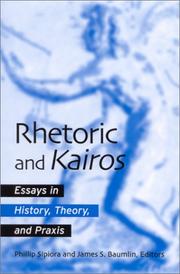
ISBN: 0791489388 0585442525 9780585442525 0791452336 9780791452332 0791452344 9780791452349 9780791489383 9780791489383 Year: 2002 Publisher: Albany, NY State University of New York Press
Abstract | Keywords | Export | Availability | Bookmark
 Loading...
Loading...Choose an application
- Reference Manager
- EndNote
- RefWorks (Direct export to RefWorks)
This collection offers the first comprehensive discussion of the history, theory, and pedagogical applications of kairos, a seminal and recently revised concept of classical rhetoric. Augusto Rostagni, James L. Kinneavy, Richard Leo Enos, John Poulakos, and John E. Smith are among the international list of scholars who explore the Homeric and literary origins of kairos, the technologies of time-keeping in antiquity, the role of "right-timing" in Hippocratic medicine, the improvisations of Gorgias, as well as the uses of kairos in Isocrates, Plato, Aristotle, Cicero, and the New Testament. Broad in its scope, the book also examines the distinctive philosophies of time reflected in Renaissance Humanism, Nineteenth-Century American Transcendentalism, Oriental art and ritual, and the application of kairos to contemporary philosophy, ethics, literary criticism, rhetorical theory, and composition pedagogy.--
Kairos (The Greek word) --- Rhetoric, Ancient. --- Rhetoric. --- Greek language --- Ancient rhetoric --- Classical languages --- Greek rhetoric --- Latin language --- Latin rhetoric --- Language and languages --- Speaking --- Authorship --- Expression --- Literary style --- Etymology --- Rhetoric --- Kairos (The Greek word). --- Rhetoric, Ancient
| Listing 1 - 10 of 34 | << page >> |
Sort by
|

 Search
Search Feedback
Feedback About UniCat
About UniCat  Help
Help News
News